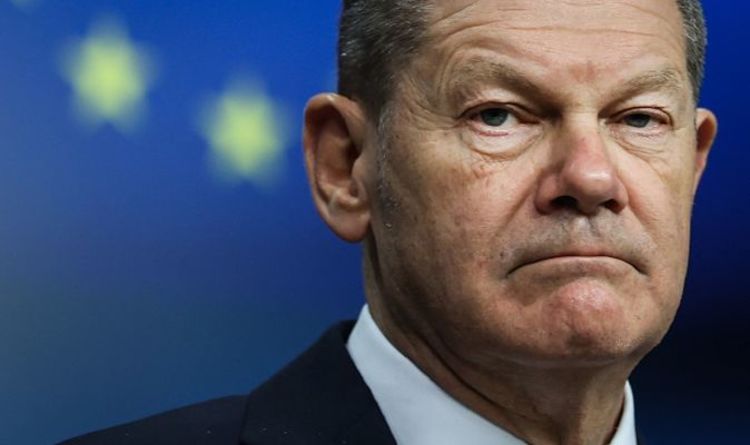Covid-19: Germany excludes unvaccinated from public life
We use your sign-up to provide content in ways you’ve consented to and to improve our understanding of you. This may include adverts from us and 3rd parties based on our understanding. You can unsubscribe at any time. More info
On Tuesday, the Ifo institute slashed Germany’s growth forecast for next year. The institute expects the EU’s biggest economy to shrink by 0.5 percent quarter-on-quarter in the final three months of this year and to stagnate in the first three months of next year.
Coupled with the current surge in overall prices, Germany is now facing several winter months of zero growth and unusually high inflation, a combination described by economists as ‘stagflation’.
For 2022 as a whole, Ifo slashed its economic growth forecast to 3.7 percent from 5.1 percent projected in September – and also confirmed its already reduced forecast of 2.5 percent for this year.
For 2023, it lifted its growth forecast to 2.9 percent from 1.5 percent.
Ifo chief economist Timo Wollmershaeuser said: “The strong recovery initially expected for 2022 will be further pushed back.”

The bleak outlook was shared by the economy ministry, which on Tuesday said in its monthly report the government expected to see “rather weak” economic output in the final quarter of the year.
Activity in the services sector will likely slow as Germany faces renewed curbs aimed at breaking its fourth wave of COVID infections, while supply bottlenecks for microchips especially in the car industry hamstrung manufacturing, the ministry said.
However, in view of the high order backlog, the ministry had a positive outlook for German exports.
The inflation rate is seen rising further in the short term, reducing the purchasing power of German consumers in light of meagre wage growth so far.
Ifo expects the national consumer price index (CPI) to rise by 3.1 percent this year and by 3.3 percent next year – both rates clearly above the European Central Bank’s price stability target of two percent for the eurozone as a whole.
READ MORE: Britons name who they want to take over from Boris
Mr Wollmershaeuser said: “Rising costs associated with delivery bottlenecks play a driving role, as does the delayed adjustment to the increased energy and raw material prices.”
In 2023, Ifo expects inflation rate to slow to 1.8 percent.
Ifo head Clemens Fuest called on the ECB to announce an end to its Pandemic Emergency Purchase Programme (PEPP) at its regular meeting on Thursday.
Mr Fuest said: “We have very strong signals from companies that significant price increases are imminent.”
Major central banks meet this week to assess risks from the new Omicron variant of the coronavirus even as they consider reducing emergency measures put in place nearly two years ago to fight the pandemic’s economic toll.
DON’T MISS:
Boris scandal blamed for ‘change’ in UK stance [ANALYSIS]
Starmer slammed after calling Labour patriotic in Plan B announcement [VIDEO]
Boris on brink: DOZEN Tory MPs line up to oust PM [INSIGHT]
The global balancing act begins Tuesday when the Federal Reserve convenes for its latest two-day meeting, and includes new monetary policy statements by the US central bank on Wednesday, the European Central Bank and the Bank of England on Thursday, and the Bank of Japan on Friday.
All are facing some version of the same dilemma – whether the need to guard against inflation and end the current era of low interest rates and central bank asset purchases is more urgent than the economic threat posed by the new variant – but their different approaches could make for a tumultuous year.
Inflation, labour markets, and the link between the virus and economic performance are behaving differently across the major economies, setting up a potentially sharp divide over how central banks manage the coming stage of the pandemic. That stands in contrast to the synchronised and massive wave of support approved at the outset of the health crisis in the spring of 2020.
The Bank of England had seemed recently on the verge of raising interest rates in a nod to high inflation, but policymakers have been set off course by Omicron’s fast spread and the imposition of new restrictions in the country. They are now expected to hold the line on borrowing costs at their meeting this week in a reminder of the pandemic’s still determinative role.
The ECB is likely to continue, and the Bank of Japan perhaps to commence, reducing some pandemic bond purchases at the margin, tentative steps reflecting the lower inflation and less fulsome economic rebounds in the euro zone and Japan. Interest rate increases for both are likely far off.
In the ECB’s case, it must also be mindful of the major differences inside the bloc for which it sets policy. Any big retreat from crisis support could deliver unwanted consequences, say, for the sustainability of the high debt loads in economies such as Italy.
Additional reporting by Monika Pallenberg
Source: Read Full Article
